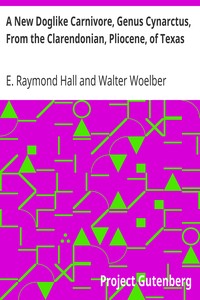A New Doglike Carnivore, Genus Cynarctus, From the Clarendonian, Pliocene, of…
"A New Doglike Carnivore, Genus Cynarctus, From the Clarendonian, Pliocene, of Texas" by E. Raymond Hall and Walter W. Dalquest is a scientific publication written in the early 1960s. This work presents findings on a newly identified species of carnivore from the Pliocene epoch, focusing specifically on the genus Cynarctus. The paper likely targets readers interested in paleontology, taxonomy, and the evolutionary history of canine species. The study introduces the species "Cynarctus
fortidens", characterized by specific dental features including a large size and unique cusp formations in its teeth that suggest a frugivorous diet. The research details the examination of fossilized remains, highlighting the holotype and additional referred material found in Texas. The authors compare "C. fortidens" with other known species, discussing its potential classification within the family Canidae and analyzing morphological traits that differentiate it from related species. This paper contributes to the understanding of carnivore evolution and dietary adaptations during the Pliocene. (This is an automatically generated summary.)
Read or download for free
| How to read | Url | Size | |||
|---|---|---|---|---|---|
| Read now! | https://www.gutenberg.org/ebooks/30260.html.images | 33 kB | |||
| EPUB3 (E-readers incl. Send-to-Kindle) | https://www.gutenberg.org/ebooks/30260.epub3.images | 155 kB | |||
| EPUB (older E-readers) | https://www.gutenberg.org/ebooks/30260.epub.images | 153 kB | |||
| EPUB (no images, older E-readers) | https://www.gutenberg.org/ebooks/30260.epub.noimages | 71 kB | |||
| Kindle | https://www.gutenberg.org/ebooks/30260.kf8.images | 391 kB | |||
| older Kindles | https://www.gutenberg.org/ebooks/30260.kindle.images | 384 kB | |||
| Plain Text UTF-8 | https://www.gutenberg.org/ebooks/30260.txt.utf-8 | 25 kB | |||
| Download HTML (zip) | https://www.gutenberg.org/cache/epub/30260/pg30260-h.zip | 144 kB | |||
| There may be more files related to this item. | |||||
Similar Books
About this eBook
| Author | Hall, E. Raymond (Eugene Raymond), 1902-1986 |
|---|---|
| Author | Dalquest, Walter Woelber, 1917-2000 |
| Title | A New Doglike Carnivore, Genus Cynarctus, From the Clarendonian, Pliocene, of Texas |
| Note | Reading ease score: 68.0 (8th & 9th grade). Neither easy nor difficult to read. |
| Credits |
Produced by Chris Curnow, Joseph Cooper, Diane Monico, and the Online Distributed Proofreading Team at http://www.pgdp.net |
| Language | English |
| LoC Class | QH: Science: Natural history |
| Subject | Carnivora, Fossil |
| Subject | Paleontology -- Pliocene |
| Category | Text |
| EBook-No. | 30260 |
| Release Date | Oct 15, 2009 |
| Copyright Status | Public domain in the USA. |
| Downloads | 126 downloads in the last 30 days. |
| Project Gutenberg eBooks are always free! | |


